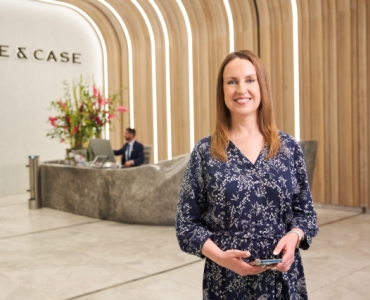
September 2024: We asked London trainees Conrad Barclay, Aashni Chohan and Rona Kamand to tell us what it's really like to train at White & Case. From the challenges and late nights to the unexpected upsides, here are some home truths about being a trainee in London.
You'll make friends for life
"The relationships you build with the trainees in your intake or otherwise are definitely one of the biggest positives to the training contract—you build a strong network of colleagues but also of friends."
"Going through the training contract with your peers builds friendships on the foundations of camaraderie. I now have friends all around the world across the White & Case network."
You'll learn how to manage competing demands
"There's a constant challenge of trying to manage and complete a number of requests for different people. You'll develop a strong ability to organise workstreams and to respond quickly when the parts are moving around you. The best thing to do in these situations is to prioritise and keep people updated—if you don't think you can make the deadline, speak up. Having strong communication skills is key!"
"The level of consistent concentration that's required every day to succeed at the job is very high, especially in transactional seats. In the disputes teams, there's a greater emphasis on analytical skills than organisational ones, but both take a lot of practice."
It helps to show up
"Being in the office helps with building relationships with colleagues, collaborating and learning from your peers or just having lunch with your fellow trainees."
"Arriving slightly earlier than your supervisor or coming in on some Mondays and Fridays are simple yet effective ways to improve your personal brand. It is also much easier to learn naturally through osmosis when you're in the office, collaborating and learning from your peers, having lunch together with your fellow trainees and building your personal brand, etc."
Networking is easier if you do your homework beforehand
"Do a bit of research before—what is the purpose of the event? Who is going to be there? What is their background? This will mean you are well prepared once you walk in to start conversation."
"Networking doesn't mean speaking about work—often, most people will prefer to chat about anything else and to use these events as a break. You're more likely to bond with someone when you connect over non-work-related topics."
"Attend all the events that you can and speak to as many people as you can. Especially when it comes to partners—the reality is that they are just as approachable as anyone else."
Embrace constructive feedback
"Everyone gets things wrong the first time, but your role is to be trained—so asking for constructive feedback will ensure that you will do a better job next time. It's the most valuable thing you can receive as a trainee."
"Always seek constructive feedback, and don't be unreasonable with your expectations of yourself—you're here to learn. Try to keep a sense of perspective when things do go wrong."
You go into work not knowing what time you will leave
"This naturally makes it difficult to make plans in advance (and can sometimes mean having to cancel plans at the last minute). However, this does mean that when you do have 'down-time' you will always try and make the most of it."
"It's crucial for trainees to develop resilience and also a taste for hard work."
Don't try to 'wing it'
"Never be afraid to ask questions if you don't understand something, as someone else definitely will, and sitting on it will only exacerbate those feelings. Feeling uncertain is 100 per cent normal, and the reality is that most (if not all) trainees will feel out of their depth at some point during their training contract, and even as associates."
People are always ready to help explain things
"I've learned that I'm capable of a lot, and that we can do anything we set our mind to as long as we're prepared to put in the work."
Believe in yourself
"White & Case hired you because they believe in you, but you have to believe in yourself too. Confidence is key to high performance, and that can only come from within."
"Have confidence and remember that you have earned your place at the Firm—you deserve to be where you are standing, so act that way."





